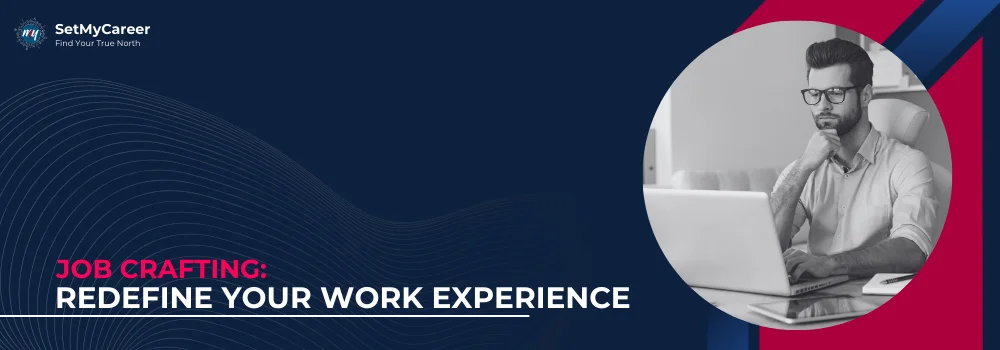
Published by Dr. Nandkishore Rathi on 10 May 2025
Chief Career Navigator
Dr. Nandkishore Rathi is passionate about identifying people's passions and helping them create and lead successful and fulfilling careers. With 30+ years of experience and interactions with thousands of students, academicians, and corporate executives, he has developed a range of career services aimed at benefiting individuals seeking a breakthrough in their professional lives.
Small Shifts, Big Impact: Take back control of your work life with Job Crafting.

What if the key to loving your job isn't changing what you do, but how you do it? In a world where career satisfaction feels increasingly elusive, job crafting offers a powerful, research-backed approach to reclaiming agency over your work. It invites professionals at all levels to redesign aspects of their role in ways that align with their values, strengths, and aspirations without waiting for promotions, new roles, or external changes. This blog dives deep into the psychology of job crafting, offering you a practical roadmap to reframe your relationship with work and rediscover a sense of purpose and engagement.
Job crafting is a concept from organizational psychology that refers to how employees proactively modify elements of their job to better fit their personal needs, interests, and strengths. It was first introduced by Amy Wrzesniewski and Jane Dutton in the early 2000s, and it's become increasingly relevant in today’s dynamic work culture.
Rather than waiting for a role to be redesigned by a manager or an HR policy, job crafting puts the individual in the driver’s seat. It empowers people to make small, intentional changes to their work environment, relationships, and responsibilities so that the job feels more meaningful.
As traditional career paths become more fluid, individuals are realizing that satisfaction doesn’t come solely from external factors like salary or job title. Engagement and fulfillment often stem from feeling seen, valued, and in sync with your deeper self.
Job crafting addresses:
Burnout and disengagement
Misalignment between role and values
A lack of autonomy or growth
Stagnation in well-established roles
It’s particularly powerful because it doesn’t require quitting, switching careers, or making drastic changes. It works within your current structure.
There are three major forms of job crafting, often overlapping:
Task Crafting – Changing what you do. Examples: Adding a new responsibility that excites you, redesigning how you approach recurring tasks, or taking on a project that aligns with a personal interest.
Relational Crafting – Changing who you interact with and how. Examples: Seeking mentorship, collaborating more often with energizing colleagues, or reducing interaction with draining dynamics.
Cognitive Crafting – Changing how you think about what you do. Examples: Reframing a routine task as essential to a larger purpose, or reminding yourself how your work positively impacts others.
Effective job crafting starts with deep self-awareness. You can’t redesign your job meaningfully unless you know what actually drives, drains, or excites you.
Start with reflective questions:
What aspects of my work do I enjoy most—and least?
When do I feel energized, and when do I feel depleted?
What are my natural strengths, and am I using them at work?
This is where tools like a career psychometric test become incredibly helpful. These assessments offer insight into your personality traits, strengths, values, and motivators—allowing you to craft with clarity rather than guesswork. Understanding your patterns through data-backed insight gives your efforts a clear direction.
Job crafting aligns beautifully with principles from positive psychology and self-determination theory. Here’s how:
Autonomy: Crafting reinforces your sense of control over your work life, even within a structured system.
Competence: It lets you lean into strengths and build mastery, boosting confidence.
Relatedness: Through relational crafting, you create more meaningful workplace connections.
The result? Greater engagement, stronger performance, and reduced burnout—all without changing employers.

Transform your work life today and take control of your life
Craft NowWhile job crafting can happen anytime, some moments lend themselves especially well:
When you're feeling stuck or bored in your current role
After a performance review that sparks self-reflection
During transitions—like a new manager or team restructure
When you're considering a career shift but aren’t sure yet
Crafting can serve as both a re-energizer and an experimenter’s lab. It is a way to test and learn what kind of work experience energizes you before making major decisions.
You don’t need a complete overhaul. Start with small, strategic shifts:
Volunteer for tasks that align with your strengths or interests
Propose a new idea or initiative that reflects your values
Reframe repetitive work through the lens of impact or service
Create space for growth by learning a skill adjacent to your role
Set boundaries that protect your focus and energy
These aren’t just tactical moves. They’re psychological interventions that help restore meaning.
Crafting isn’t always smooth. You might face internal doubts or external resistance:
“Will my manager allow this?” → Start with low-risk shifts that improve productivity or morale.
“Is this selfish?” → Job crafting improves not just your well-being but often team dynamics too.
“I don’t have time.” → You don’t need hours. Even a 10-minute reflection or one new task a week matters.
Approach crafting with curiosity, not pressure.
In large organizations: Navigate systems respectfully but creatively. Use pilot projects or innovation initiatives as entry points.
In remote/hybrid work: You may have more autonomy. Use it. Redesign your routines, communication styles, and workspace.
In leadership roles: Leaders can craft their roles and model it for others, fostering a culture of ownership and innovation.
In early careers: Use job crafting to shape a generalist role into one that reflects your emerging strengths and aspirations.
Job crafting isn’t a one-time fix. Your needs and career goals will evolve. And so should your approach. Make it a quarterly ritual:
Reflect on what’s working
Identify new interests or skills
Realign your tasks or mindset
Crafting becomes not just a strategy but a career habit.
Job crafting isn’t about escaping your job. It’s about reimagining it. With the right mindset, self-insight, and incremental actions, you can transform how you experience your work. Instead of waiting for change, you create it from the inside out. Whether you're a career fresher navigating mid-career shifts, or seeking renewed meaning in a long-held role, job crafting is a reminder that agency, growth, and satisfaction are not external rewards. They begin with how you choose to show up every day and what you choose to make of the work already in your hands.
No. 14/595, 1st Floor, Nanjappa Reddy Layout, Koramangala 8th Block, Bangalore 560095